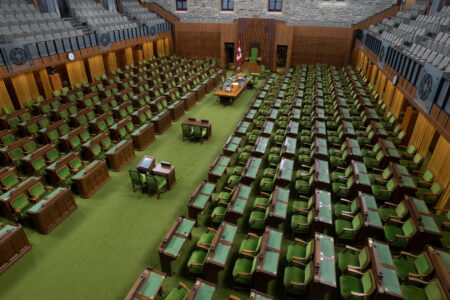
I learned from my mentors in the practice of law many years ago that it’s wise to begin with a strategic conces- sion. I’m about, therefore, to make a strategic concession. Freedom of speech, the right of protest and freedom of assembly are not and cannot be absolute. There are occa- sions when these fundamental freedoms must be controlled in the interests of other values and interests. Having said that, I also insist that freedom of expression is the lifeblood of the democratic system. It is the vehicle that enables any of us to try to mobilize public support for the redress of our grievances. Experience has taught us that injustice is less likely to endure””or even to emerge””in an atmosphere of free public debate. In that sense, freedom of expression is what my favourite philosopher used to call a ”œstrategic free- dom”””a freedom on which other freedoms depend. A wise old trade unionist used to describe freedom of expression as the ”œgrievance procedure” of a democratic society.
When I began my career with the Canadian Civil Liberties Association around 1968, I had some experiences that began to tell me something about our attitude to free- dom of expression in this country. A group of Vietnam War protesters applied for a parade permit to march down Toronto’s busy Yonge Street on a Saturday that coincided with the annual international day of protest against theVietnam War. Instead they got a permit to march down Bay Street and University Avenue. Now, I don’t know how many of you have ever been on Bay Street or University Avenue in Toronto on a Saturday, but if you have, you were probably the only ones there. This led me to speculate that in Canada we don’t ban demonstrations, we reroute them. So this becomes, as one author once suggested, not an exercise in freedom of communication but an exercise in freedom of soliloquy. You can say anything you like in your backyard or your bathtub. The problem will arise if you seek access to live people.
In checking this out a little further, we discovered that there was a parade by-law in Toronto enacted by, of all agen- cies, the police commission, the predecessor of our current police services board. The by-law said that you can’t get parade permits for normally busy streets unless you’ve been doing so for 10 consecutive years prior to October 1, 1964. This creates what we lawyers call a ”œvested interest.” In Toronto, the Santa Claus Parade is a vested interest. The Orange Parade is a vested interest. But political protest, you will appreciate, usually arises in a contemporaneous con- text. You’re not going to find too many people now asking for a parade permit to protest Mackenzie King’s conscription policies.
There was another exception. The by-law said that the chair of the police commission and the chief of police may waive the busy street prohibi- tion and grant a busy street parade permit under what the by-law called ”œunusual circumstances of municipal, provincial, or federal importance.” So, of course, we wanted to check how they had applied this before. We found that just a few months earlier, they had granted a Yonge Street parade permit on a Friday afternoon, even busier than a Saturday, to a visiting convention of the Fraternal Order of Eagles. That organization was allowed to tie up Toronto’s busy Yonge Street for five hours with 5,000 marchers and 35 marching bands. And a few months after this occurred, they gave a Yonge Street parade permit, again on a Friday, to an organization whose name was so exotic it has embedded itself in my psyche, I’m sure in perpetuity””the Mystic Order of the Veiled Prophets of the Enchanted Realm.
As I became more suspicious, I looked at the law of picketing. I examined a Supreme Court of Canada judgment setting out the limits of per- missible behaviour on labour picket lines. The judgment of the Court was expressed through the late Mr. Justice Ivan C. Rand. He said that there is a difference between argumentative and ran- corous badgering and importunity, on the one hand, and attempting to communicate informa- tion for the purpose of persuasion by the force of rational appeal, on the other hand. Those words were written by the most liberal justice of that era. A few years after the Vietnam controversy, another significant event took place. In the con- text of upholding an anti-demonstration by-law enacted by the City of Montreal, the Supreme Court of Canada said that demonstrations are not so much an exercise in speech as a collective action; they are more in the nature of a show of force than an appeal to reason.
All of which led me to ask the question, and I continue to ask it, why does free speech have to appeal to reason? I hate to say this at a universi- ty, but who in the real world is persuaded by rea- son? People are persuaded not by reason but by pressure. Politicians hungering for position are much more likely to be persuaded by political tension than by logical syllogism. Tight-fisted employers will be more vulnerable to well-organ- ized strikes than to well-prepared sermons.
Now, I don’t want anyone to get the idea that I’m opposed to the use of reason. To put the matter in perspective, pressure without reason may be irresponsible, but reason without pressure will be ineffectual. To be sure, permissible pressure cannot include the commission or even the threat of physical violence. But it must be able to include the infliction of political, economic and social injury. And freedom of expression must be able to include the right to threaten such injury and the right to try to recruit support in order to inflict such injury. That’s what freedom of expression must be able to entail.
There is a curious resistance in this country to the notion of unpleasant pressure. As long as expression confines itself to the canons of Emily Post, to politeness and to reason, we don’t have much of a problem. But when it becomes unpleasant, we start having problems. I noticed a pattern developing in the way we handle unpleasant pressure in this country.
In the early 1970s, a rather bitter strike hit La Presse here in Montreal. The authorities cordoned off a large area and wouldn’t let the strikers come close to the building that housed La Presse. In the early 1980s, there had been a bombing at Toronto’s Litton Industries, the company that used to manufacture the guidance system for the cruise missiles. The police would not allow anti- war protesters to come within half a mile of Litton Industries. Then, in the early 1990s, British Columbia enacted legislation that restrict- ed the right to express disapproval of abortions within 50 metres of abortion clinics. And then, in 2001, the authorities in Quebec City kept the anti-globalization activists some distance from the international trade conference (the Summit of the Americas) that they were protesting. The authorities would always say, ”œYou can go some- where else to protest.” You can always go to a back alley and have your protest. But it’s when you want to confront those whose conduct you’re protesting that you can have a problem.
This is not to suggest that protesters should be able to go wherever, whenever they wish. To be sure, their interests must be balanced against those of all the others who wish to use the streets. I am simply arguing here that a necessary prereq- uisite for striking the appropriate balance is a recognition that, while a legitimate protest must not be able to inflict or threaten physical vio- lence, it must be able to generate political, social and/or economic tension. To the extent that the rights of the protesters are confined to the use of politeness and reason, it will be impossible to reach anything resembling a fair balance of the competing interests.
And now we face Bill C-35. This is part of the litany of anti-terrorist measures that have emerged in the last number of months. Bill C-35 seeks to empower the RCMP to create perimeters around inter-governmental conferences. It says that the RCMP, in the interests of protecting security at these conferences, may take appropri- ate measures to the extent, and in a manner”” these are the very words of the bill”””œthat is rea- sonable in the circumstances.”
Nowhere does the bill try to provide any guidance as to how to interpret these terms, and nowhere is there an attempt to spell out the many interests that must be accommodated. Now, in this connection, there was a rather interesting sit- uation at the APEC conference in Vancouver dur- ing 1997. An RCMP inspector who had been involved in the decision to remove protest signs that were then lawfully on display was asked about this decision some time afterwards when he appeared as a witness before the Hughes Inquiry. He said that he was not thinking about the Charter. What, then, was he thinking about? He was thinking about””these are his words””what was ”œreasonable in the circumstances.” So, you had this RCMP inspector purporting to justify the infringement he committed on the constitutional right of free speech by reference to criteria identi- cal to those found in Bill C-35.
Not only did this bill fail to spell out specific criteria, but it was also defective for the amount of power it reposed in the RCMP and other police. After all, the decision to deny people access to places otherwise accessible involves more than security. As important as security is, there are other interests that need to be accommodated. There are the interests of homeowners, tenants, businesses, workers, tourists and, yes, I will say it, demonstrators and protesters. They also have legitimate interests that need to be considered.
My organization, the Canadian Civil Liberties Association, thinks that it’s particularly inappropriate to give the police the power to adjudicate among all of these competing inter- ests. Except in exigent circumstances and in front-line situations where we understand the police must have a little more leeway, the role of the police in a democracy should be to enforce decisions in such matters made by others, and not to be making the decisions themselves. When the police make a decision of this kind, it’s vulnerable to the perception that it was done in order to make their jobs as easy as possible for themselves. This, incidentally, is an altogether human thing to do. As sympathetic as anyone might be to the job they have to discharge, and as sympathetic as we ought to be to the interests of security, that interest has to be balanced against the competing interests.
As for the protesters, they have a legitimate interest in getting as close as possible to those whose conduct they are protesting (and here, ”œlegitimate interest” refers only to lawful protests; those who seek to protest unlawfully””even if non-violently””cannot make the same claim to our solicitude). They shouldn’t be able to get so close as to physically intimidate, but they have to be able to get close enough to politically castigate. It’s important for the viable right of protest that periodically the protesters be seen and heard, if not, at any time, felt or smelt. Their legitimate interest is to get as close as possible so that they can generate an atmosphere of political tension for those whose conduct they’re protesting.
On the other hand, the interest of the police is to get them as far away as possible. A col- league of mine, Terry Meagher, who used to be the secretary-treasurer of the Ontario Federation of Labour, once put this very nicely. He said, ”œIn a democratic society, no one should be the umpire of his own ballgame.” The police, there- fore, should not be the ones making decisions of this kind. Some politically responsible, account- able person should have to carry the can for adju- dicating among all these interests. And even then the decision should be subject to court approval. There’s no reason why this shouldn’t be done. Apart from exigent circumstances and front-line situations, there’s usually enough time (especial- ly when the conferences are international in scope) so that proper notice can be provided, decent plans can be drawn up and fair hearings can be conducted.
To conclude, I come back to where I began. When it comes to the right of protest, as much as possible the critical decisions should be made not by police but by politically accountable people, and then be subject to alteration by the courts. The critical issue we must confront is that the right of protest has to include the right to inflict unpleasant, but non-violent, pressure on those whose conduct is being protested. The canons of Emily Post need not””and should not””be the basis for determining the rights of protest.







